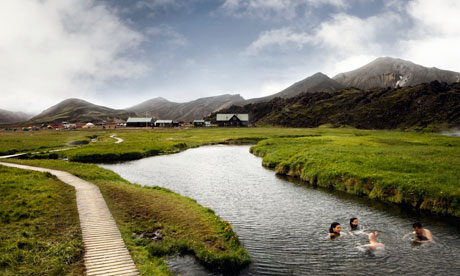
In satellite images Iceland at this time of year appears ghostly, bone-white. A liminal, frontier place, it swings from the Arctic ceiling of Europe like a Halloween lantern. Over the past year it has been rarely out of the headlines; whether its volcanoes are spewing ash, its banks are collapsing, or its glaciers are showing us a globally warmed future. For Icelanders the future has rarely seemed more uncertain.
Perhaps they are better equipped than the rest of us to go on living with the past – their language has changed little in a thousand years, and surveys reliably report that more than a quarter of the population believe in huldufólk; a "hidden people" of trolls, elves and fairies.
From Reykjavik, home of Álfaskólinn, the Icelandic Elf School, I went east into the simmering volcanic landscape around Mount Hekla, not far from Eyjafjallajökull, the volcano which erupted in March. In the 18th century the nearby Laki volcano trailed a banner of soot across Europe for eight months straight. Some scholars believe the resulting famines led directly to the French Revolution.
Driving through Iceland it is possible to understand why here, more than anywhere in Europe, belief in the supernatural has clung on into the modern world. Powerful, unpredictable forces are in evidence, bubbling just under the thin skin of the earth.
The landscape is extraordinary. I passed mountains of pink and orange rhyolite gashed by hot volcanic rivers. Geysers like whale-blows sprayed plumes of rainbow mist. I could feel the magma chambers beneath me, the seismic heave of plate tectonics, the earth's crust living and growing. Why shouldn't there be trolls and witches too? At Landmannalaugar the rivers were smoking with steam. I parked the car, grabbed my book of Icelandic sagas and jumped in. The sagas are swashbuckling tales first written down in the 12th century, and always depict the volcanic interior of Iceland as a cursed place, the haunt of ghosts and outlaws.
I lay submerged reading Grettir the Strong, in which the hero kills a draugr (a sort of stinking medieval zombie) and is exiled to walk the interior of Iceland for 20 years. There are worse fates.
A figure slid into the pool beside me. He said he was a computer programmer from Reykjavik, and he wanted to know my impressions of his country.
"Are you camping here?" he asked.
"No," I said, "I'm camping at Laki tonight."
"Laki! You can't camp up there!"
"But my map shows a campsite …" I said.
"Yes … but … how you say in English … it's haunted!"
I lifted up the book I'd been reading, and gave him a smile. "By the ghost of Grettir the Strong?"
"Don't joke," he said, and frowned.
It was cold in the evening's ebbing light. The sky was crimson, as if the sun had been knifed and was bleeding out along the horizon. "Superstitious nonsense," I thought to myself as I climbed into my tent. "Haunted!"
Maybe the footsteps I heard were my imagination, or maybe the past just is more alive in Iceland.
• Iceland Express (icelandexpress.com) flies to Reykjavik from London from £190 return. Álfaskólinn, the Icelandic Elf School (Sidumuli 31, 108 Reykjavik, +354 894 4014), runs short courses about the huldufólk
Gavin Francis (gavinfrancis.com) is the author of True North: Travels in Arctic Europe, Polygon £9.99

